Table of Contents
The global automation testing market is forecasted to grow significantly from USD 30.5 billion in 2023 to approximately USD 140.4 billion by 2033, exhibiting a robust CAGR of 16.5% during 2024-2033. This growth is fueled by the rising demand for efficient software testing processes, increasing complexity of applications, and the adoption of DevOps and Agile methodologies. Automation testing enhances accuracy, reduces time-to-market, and improves overall software quality, making it essential for industries like IT, BFSI, healthcare, and telecom.

How Tariffs Are Impacting the Economy
U.S. tariffs on imported electronics and software components indirectly impact the automation testing market by raising costs for hardware, cloud infrastructure, and software licenses. These increased expenses lead to higher operational costs for testing service providers and enterprises. According to Yale Budget Lab, tariffs have driven a 1.7% increase in consumer prices and reduced real household incomes by roughly $1,200 annually.
➤ Discover how our research uncovers business opportunities @ https://market.us/report/automation-testing-market/free-sample/
(Use corporate mail ID for quicker response)
Supply chain disruptions compel firms to diversify suppliers or move manufacturing closer to reduce tariff exposure, increasing logistics complexity and costs. The uncertainty surrounding trade policies slows investments in technology upgrades and innovation. Consequently, tariff-related cost pressures may hinder the rapid adoption of automation testing solutions critical for software development efficiency and business competitiveness.

Impact on Global Businesses
Rising Costs & Supply Chain Shifts
Automation testing vendors and enterprises face rising costs for testing hardware and cloud services due to tariffs. Companies are diversifying supply chains and investing in localized infrastructure to mitigate risks, resulting in short-term increased expenses.
Sector-Specific Impacts
- IT & Software: Delays in adopting latest testing tools due to cost pressures.
- BFSI: Regulatory demands increase testing scope amidst higher operational costs.
- Healthcare: Slower deployment of automated testing affects software validation.
- Telecom: Increased expenses impact rollout of 5G-enabled testing environments.
➤ Get full access now @ https://market.us/purchase-report/?report_id=125428
Strategies for Businesses
Businesses adopt supply chain diversification, cloud migration, and automation of test management to reduce dependency on tariff-affected components. Strategic partnerships and flexible subscription pricing models help maintain market competitiveness. Engaging with policymakers supports favorable trade environments.
Key Takeaways
- Tariffs increase hardware and software costs.
- Supply chain resilience is crucial.
- Sector impacts vary but generally slow adoption.
- Investment in cloud and automation drives efficiency.
Analyst Viewpoint
Despite tariff-induced challenges, the automation testing market growth remains robust, driven by digital transformation demands. Companies agile in supply chain adjustments and technology adoption will lead. Stabilizing trade policies are expected to foster accelerated innovation and expansion.
Regional Analysis
North America dominates the market with advanced IT infrastructure and early technology adoption. Europe follows with growing compliance-driven testing needs. Asia-Pacific is the fastest-growing region, propelled by expanding software industries and digital initiatives. Emerging markets present growth potential despite infrastructural challenges.
Business Opportunities
Opportunities lie in AI-driven testing tools, cloud-based testing platforms, and sector-specific automated solutions. Growing demand for continuous testing in DevOps environments fuels innovation. Expansion into emerging markets and partnerships for customized solutions enhance growth prospects.
Key Segmentation
- By Testing Type: Functional, Non-functional, Continuous testing.
- By Deployment: On-premises, Cloud-based.
- By Application: IT & Software, BFSI, Healthcare, Telecom, Others.
- By Region: North America, Europe, Asia-Pacific, Latin America, Middle East & Africa.
Key Player Analysis
Market leaders focus on R&D in AI and machine learning for smarter testing, cloud integration, and enhancing user experience. Strategic alliances expand geographic reach. Emphasis on security and compliance ensures client trust and adherence to regulations.
Recent Developments
Recent advancements include AI-powered test automation, integration with CI/CD pipelines, and expansion of cloud testing services. Partnerships between testing vendors and cloud providers enhance scalability.
Conclusion
The automation testing market is poised for strong growth despite tariff-related cost pressures. Strategic supply chain management and innovation will enable businesses to capitalize on rising digital transformation demands globally.


